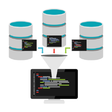SPSS for Windows
- By Spss
- Trial version
- User Rating
Used SPSS for Windows?
Editors’ Review
SPSS is a mature analytics suite built for reliable statistical work. It covers descriptive statistics, regression modeling, and predictive analytics, with data preparation tools that streamline cleaning. Procedure workflows and consistent outputs make it a staple for teams needing accuracy, auditability, and repeatable studies across research and business settings.
Beyond basics, SPSS delivers analysis without forcing code, while staying friendly to coding through extensions. Teams value its wide method coverage, scriptable workflows, and consistent performance that scales well to large datasets. New users may face a learning curve, and licensing can be costly, but reliability and community know-how offset that.
Built for robust, repeatable analysis workflows
SPSS emphasizes durable mechanics: define a dataset, select procedures, and capture steps as automation syntax for reruns on new data. That script links with Python integration to batch tasks and extend methods when needed. The result is traceable, scriptable analysis with minimal friction. Power users move between menus and code, keeping models reproducible while avoiding the overhead of maintaining separate pipelines. Audit-ready logs make reviews straightforward.
Output focuses on answers: custom tables let analysts shape deliverables, and chart builder produces quick visuals for stakeholders without derailing workflow. Performance stays steady on multi-sheet imports and chained runs, and it scales well to large databases when storage and memory are provisioned. For comparison, alternatives like R, Python toolchains, Stata, or JMP trade openness, licensing, and learning paths differently, depending on team preferences and constraints.
Usability stays pragmatic: wide method coverage reduces tool-switching, and scriptable workflows help teams standardize studies. Consistency across dialogs and outputs speeds reviews and handoffs. Trade-offs exist: a learning curve awaits newcomers, licensing costs can be significant for budgets, and the closed ecosystem limits customization compared to open-source stacks. Even so, predictable results and audit-ready logs keep projects moving when deadlines and compliance requirements matter for research, reporting, and operational decision-making.
Pros
- Wide method coverage
- Scriptable workflows
- Consistent performance that scales well
- Audit-ready logs
Cons
- Learning curve for new users
- Licensing costs can be significant
- Closed ecosystem limits customization
Bottom Line
Reliable choice for serious statistical work
SPSS is well suited to teams that need dependable analytics with repeatable mechanics and governance-friendly audit trails. Its broad methods, scriptable runs, and steady performance justify adoption where accuracy, reproducibility, and throughput matter. Despite a learning curve and licensing costs, the tool remains a must-have when organizations require consistent, validated outputs from a mature platform that supports standardized studies across research and operational use cases.
What’s new in version 28.0.1
- Faster procedure execution and improved stability on large datasets
- Expanded scripting hooks for smoother batch automation
- Refined import handling for spreadsheets and delimited files
- Quality-of-life updates across output management and labeling
Explore More

Microsoft Visual FoxPro 9.0 Service Pack 2.0
Free
Microsoft SQL Server 2005 Express Edition Service Pack 4
Free
Microsoft SQL Server 2008 Express (64-bit)
Free
Toad for Oracle (64-bit)
Trial version
SAP Crystal Reports 2020
Trial version
xSQL Script Executor
FreeSkifta
FreeValentina Studio
FreeSendBig
FreeCSViewer
FreeAirStream
FreeCigati Access Database Recovery
Free